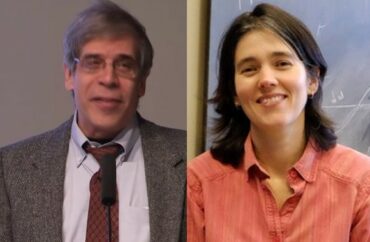
Human sex is not a ‘spectrum,’ and males and females have natural average differences, authors wrote
Leftist politics poses a “grave threat” to biological research by designating forbidden topics that won’t receive government funding, telling scientists words that they may not use and specifying how science should be taught and promoted, two biologists wrote.
Science “is endangered by political dogma,” ecologist and Professor Emeritus Jerry Coyne of the University of Chicago and biology Professor Luana Maroja (pictured) wrote in the latest issue of Skeptical Inquirer.
“Sadly, by the time [this becomes] apparent to everyone, it might be too late,” they wrote.
The authors cited six examples of dangerously politicized research.
First, they debunk the claim that sex in humans is “a spectrum.”
This statement is wrong because “nearly every human on earth falls into one of two distinct categories.”
“Your biological sex is determined simply by whether your body is designed to make large, immobile gametes (eggs, for females) or small and mobile gametes (sperm, characterizing males),” they wrote.
Even more, “individuals are often said to have been assigned their sex at birth… as if this were an arbitrary decision by doctors—a ‘social construct’—rather than an observation of biological reality,” Maroja and Coyne wrote.
“Even the Society for the Study of Evolution, which should know better, was swayed by ideology to publicly declare that biological sex should be viewed as a continuum,”they wrote. “Teachers have been hounded out of their jobs and deprived of their classes simply for declaring that human sex is binary.”
Affirming the binary nature of sex is crucial because it helps us understand differences between males and females in behavior and experience, in humans as well as other animals.
That brings the researchers to the next political fallacy: all differences between males and females are produced by society.
“To a biologist, this mistaken notion—which may stem partly from the Marxist faith in the infinite malleability of humans—is profoundly wrong,” they wrote.
The biologists noted “studies clearly show that there are average differences between men and women in a long list of behaviors influenced by biology,” a list that includes “sexual interests, parental care, aggression, degree of promiscuity, risk-taking, interest in people versus things, empathy, fearfulness, spatial abilities, violence, and traits connected to social relations.”
Social expectations likely contribute to average differences. But biologists cannot concede that these differences come solely or even primarily from socialization.
Third, some leftists have mistakenly argued that science about the evolutionary roots of behavior is “a bogus field.”
“By walling off a huge area of research and teaching that involves human nature, the ideological vilification of evolutionary psychology prevents us from understanding our own species,” the authors wrote.
The fourth fallacy is that we should resist the study of genetic differences in behavior between individuals.
Many people assume “that the genetic differences between people in traits such as educational achievement, IQ, and similar traits shouldn’t be studied,” the authors wrote. “Such work is thought to inevitably produce ranking of people, a promotion of bigotry, and an unfair sorting of individuals onto different educational tracks.”
However, useful genetic research has enabled us to make helpful predictions about people simply by analyzing DNA.
This can even be done on the DNA of human fetuses.
Fifth, many allege for political reasons that ethnic groups have no genetic differences.
However, studying differences between ethnic and even racial groups is medically useful. Studying the genetics of ethnicity is also useful for forensic reasons.
The political notion that indigenous “ways of knowing” are equivalent to modern science is the last political distortion the authors assert.
Science is often deemed “colonialist” or “racist,” with “Indigenous knowledge” championed as of even greater value.
In fact, the New Zealand government requires indigenous “ways of knowing” to be given equal status to modern science in the classroom—and to other subjects in all secondary school education.
However, “practical knowledge is not the same as the systematic, objective investigation of nature,” the authors wrote.
Even more, the way science has been used negatively at some times does not invalidate the scientific method.
The situation is worse than biological distortions during the Soviet Union, authors say
Scientists both inside and outside academia “were among the first” to misconstrue or lie about politically incorrect truths.
Ideologically motivated people launched political campaigns to remove from the scientific jargon words “deemed offensive,” in order to to “ensure that results that could “harm” people seen as oppressed were removed…and to tilt the funding of science away from research and toward social reform.”
Last year, several science articles detailed claims from researchers that they are not allowed to use certain datasets to investigate topics deemed stigmatizing or taboo, The College Fix reported at the time. Such topics include the genetic influence on intelligence, educational attainment and health.
Coyne and Maroja said that the situation today is “worse” than the suppression of science by the former Soviet Union.
Although biology has clashed with ideology at other times and places…the present situation is worse, for it affects all scientific fields, the authors said. [Emphasis in the original.]
Though the researchers concentrate on evolutionary biology because it is their field, we add that related ideological conflicts are common in sciences such as chemistry, physics, math, and even computer science.
This obsession with “radical egalitarianism,” which they call “a form of faith,” has punished scientists whose research strays from the ideology, chilled research and denied the value of merit in hiring faculty and accepting students.
Unless progressive ideology is pushed back, and “unless scientists finally find the courage to speak up against the toxic effects of ideology on their field, in a few decades science will be very different from what it is now,” Coyne and Maroja wrote.
“Indeed, it’s doubtful that we’d recognize it as science at all,” they concluded.
MORE: Evolutionary biologist: two sexes exist
IMAGES: HumanistsUK/Youtube, American Council of Trustees and Alumni
Like The College Fix on Facebook / Follow us on Twitter






Please join the conversation about our stories on Facebook, Twitter, Instagram, Reddit, MeWe, Rumble, Gab, Minds and Gettr.